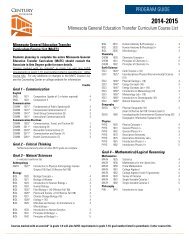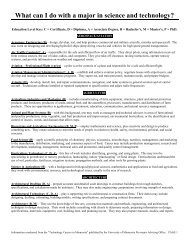2010-11 Course Catalog - Century College
2010-11 Course Catalog - Century College
2010-11 Course Catalog - Century College
You also want an ePaper? Increase the reach of your titles
YUMPU automatically turns print PDFs into web optimized ePapers that Google loves.
7 <strong>Course</strong> Descriptions2085 because that also has a service learningrequirement.Introduction to CorrectionsCJS 2083 3 CreditsThis course will use the criminal justiceperspective to explore analysis of correctionsand correctional policy within the criminal andjuvenile justice system in American society.Systematic organization of punishment andincarceration will be studied according toinstitutional and community-based programswith regard to recurrent and chronic issuesfor management and officers. This course is arequirement for the criminal justice programand the investigative sciences program forcriminal justice.Recommendation: Students should havecompleted 15 college credits prior to takingthis class. Assessment score placementin RDNG 1000 or above, or completion ofRDNG 0090 with a grade of “C” or higher andassessment score placement in ENGL 1021, orcompletion of ENGL 0090 with a grade of “C”or higher.Community CorrectionsCJS 2084 3 CreditsThis course introduces alternatives totraditional incarceration for convictedcriminals and people on probation and parole.Topics include the history of communitycorrections and alternatives available, thelegal framework for community corrections,the growth potential of the field, and the roleof the corrections professional. This courseapplies to students interested in the criminaljustice, law enforcement, human services,emergency medical services (EMS), and publicsafety fields.Prerequisite: Assessment score placement inRDNG 1000, or completion of RDNG 0090 witha grade of “C” or higher; assessment scoreplacement in ENGL 1021, or completion ofENGL 0090 with a grade of “C” or higher; CJS2083 with a grade of “C” or better or instructorconsent. Recommendation: completion of orconcurrent enrollment in CJS 2095.Juvenile Justice and DelinquencyCJS 2085 3 CreditsThis course is an introductory survey ofthe juvenile justice system with specificcoverage of terminology, laws, and proceduresunique to the juvenile in the system. This126 <strong>Century</strong> <strong>College</strong> <strong>2010</strong>-20<strong>11</strong>course also covers theories of delinquency,delinquent acts, corrective actions, custody,and disposition. There is a 40 hours servicelearning requirement for this class.Restriction: It is advised that students notenroll in this course concurrently with CJS2081 Police in the Community because thatalso has a service learning requirement.Recommendation: Fifteen college credits.Assessment score placement in RDNG 1000or above, or completion of RDNG 0090 with agrade of “C” or higher and assessment scoreplacement in ENGL 1021, or completion ofENGL 0090 with a grade of “C” or higher.Criminal LawCJS 2089 3 CreditsThis course offers students a foundation inthe interpretation of criminal law. Examplesof criminal cases will be used to illustrateand analyze the essence and interpretation ofcriminal law. Sociological theory and methodswill be used to study the substantive natureand historical development of criminal law andits role in shaping society.Prerequisite: An assessment score placementin RDNG 1000, or completion of RDNG 0090with a grade of “C” or higher; assessmentscore placement in ENGL 1021, or completionof ENGL 0090 with a grade of “C” or higher.Recommendation: Fifteen college creditsprior to enrollment in this course. Any coursein Criminal Justice Sciences should be amongthese credits.Crime and Incident Mappingfor Public Safety ICJS 2091 3 CreditsThis course is designed to teach interactiveusage of crime mapping techniques as wellas develop an understanding of social andgeographical principles and issues for crimemapping. This course will be especiallyhelpful for people intending to work withinthe criminal justice system or publicsafety. Students will develop a theoreticaland applied understanding of developingtechnology for the interpretation of social andgeographical data.Prerequisite: An assessment score placementin RDNG 1000 or completion of RDNG 0090with a grade of “C” or higher; assessmentscore placement in ENGL 1021 or completionof ENGL 0090 with a grade of “C” or higher.Students must have at least 15 college creditsbefore enrolling in this class. CAPL 1000 orequivalent computer experience is required.Crime and Incident Mappingfor Public Safety IICJS 2092 3 CreditsIn this course, students will use criminaljustice Geographic Information Systems(GIS) software for mapping informationthat uncovers emerging geographic anddemographic patterns of crime and otherevents according to location and socialsignificance. Students will query data, workingwith specific attributes and software featuresto aggregate and analyze data. Studentswill create and edit spatial data and becomeacquainted with other types of data imagesand computer-aided design (CAD) drawings.Prerequisite: CJS 2091 with a grade of “C”or higher or consent of the instructor.Terrorist and Extremist GroupsCJS 2093 3 CreditsThis course examines the social trend ofterrorism. Social theory and methods withinthe criminal justice perspective are used toanalyze group dynamics and social interaction.Group leadership, social influence, socialnetworks, group cohesion, development, groupperformance, and motivation of terrorism willbe studied. Groups that will be consideredin course material will include extremistgroups prone to violence, terrorism, and antigovernmentsentiment.Prerequisite: Fifteen college credits and anassessment score placement in RDNG 1000,or completion of RDNG 0090 with a grade of“C” or higher; assessment score placement inENGL 1021, or completion of ENGL 0090 witha grade of “C” or higher.Fundamentals of Criminal InvestigationsCJS 2094 3 CreditsThis course will explore the fundamentalprinciples and procedures employed in thecriminal investigation process. Students willexamine the various methods and techniquesutilized by law enforcement to solve a varietyof crimes. Areas of study will include thepreliminary and follow-up investigation,crime scene analysis, evidence collection andprocessing, report writing and preparing acase for prosecution.Prerequisite: Assessment score placement inRDNG 1000, or completion of RDNG 0090 with
















